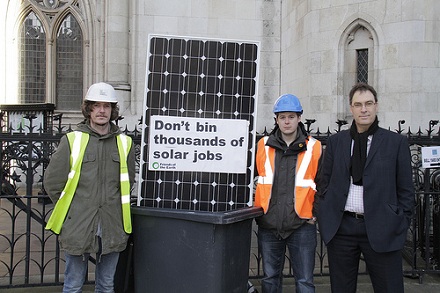The High Court has ruled that Government plans to rush through cuts to solar tariff payments were unlawful. This was in response to a legal challenge by Friends of the Earth and two solar firms – Solarcentury and HomeSun.
 |
| [relatedPosts title=”Related Posts”] |
|
|
The court agreed that proposals to cut feed-in tariff payments for any solar scheme completed after 12 December – 11 days before the official consultation closed – were unlawful.
Friends of the Earth is urging the Government to come up with a new proposal which would allow solar payments to fall in line with reduced installation costs, while ensuring the solar industry continues to play a key part in developing a cleaner future.
The environmental campaigning charity is also calling for more money to encourage solar installations – paid for by the revenue the industry raises for the Treasury, the removal of planned restrictions that would prevent poorer households from installing solar panels and more support for community-owned schemes.
Friends of the Earth’s Executive Director Andy Atkins said:
“These botched and illegal plans have cast a huge shadow over the solar industry, jeopardising thousands of jobs.
“We hope this ruling will prevent Ministers rushing through damaging changes to clean energy subsidies – giving solar firms a much-needed confidence boost.
“Ministers must now come up with a sensible plan that protects the UK’s solar industry and allows cash-strapped homes and businesses to free themselves from expensive fossil fuels by plugging into clean energy.”
“Solar payments should fall in line with falling installation costs but the speed of the Government’s proposals threatened to devastate the entire industry.”
DECC Appeal Feed-In-Tariff Decision
DECC (Department of Energy & Climate Change) have now lodged an appeal to the High Court Decision. On the FITs appeal, A DECC spokesperson said:
“We have lodged grounds of appeal with the Court of Appeal. We hope that permission will be granted for an appeal and that we can secure a hearing as soon as possible so that we can provide clarity for consumers and industry on the way forward following the consultation.
“The High Court’s decision was based on the view that the proposed approach to implementing new tariffs for solar PV is inconsistent with the FIT scheme’s statutory purpose of encouraging small-scale low-carbon electricity generation.
“We disagree with this for a number of reasons. The overriding aim of the proposed reduction in tariffs for solar PV (as set out in the recent consultation) is to ensure that over the long term as many people as possible are encouraged to install small scale low-carbon generation (including other technologies as well as solar PV) and benefit from the funding available for the FIT scheme. Without an urgent reduction in the current tariffs, which give a very generous return, the budget for the scheme would be severely depleted and there would be very little available for future solar PV generators, or for other technologies. Our view is that the urgent steps we have proposed to protect the scheme for the future are fully consistent with the scheme’s statutory purpose.
We have also made the point that the judicial review was premature as no decision has yet been taken, and a decision will only be taken after a full analysis of the responses to the consultation.”
Background
The legal challenges focused on Government plans to slash solar feed-in tariff subsidies – payments made to households and communities that generate green electricity through solar panels – on any installations completed after 12 December last year.
The Government was running a consultation into feed-in tariffs – but the 12 December cut-off point came eleven days before the consultation ended. Friends of the Earth said this premature decision was unlawful and has already led to unfinished or planned projects being abandoned.
Friends of the Earth’s legal challenge to cuts in solar incentives is part of its Final Demand campaign, which is calling for energy we can all afford and a public inquiry into the power and influence of the Big Six energy companies.
Solar is a growing, successful industry. The cuts could cost up to 29,000 jobs and lose the Treasury up to £230 million a year in tax income, a report commissioned by Friends of the Earth and Cut Don’t Kill – an alliance of solar firms and consumer and environmental organisations – revealed in November. In December, construction firm Carillion warned 4,500 workers their jobs are at risk because of the Government’s proposals.
.





